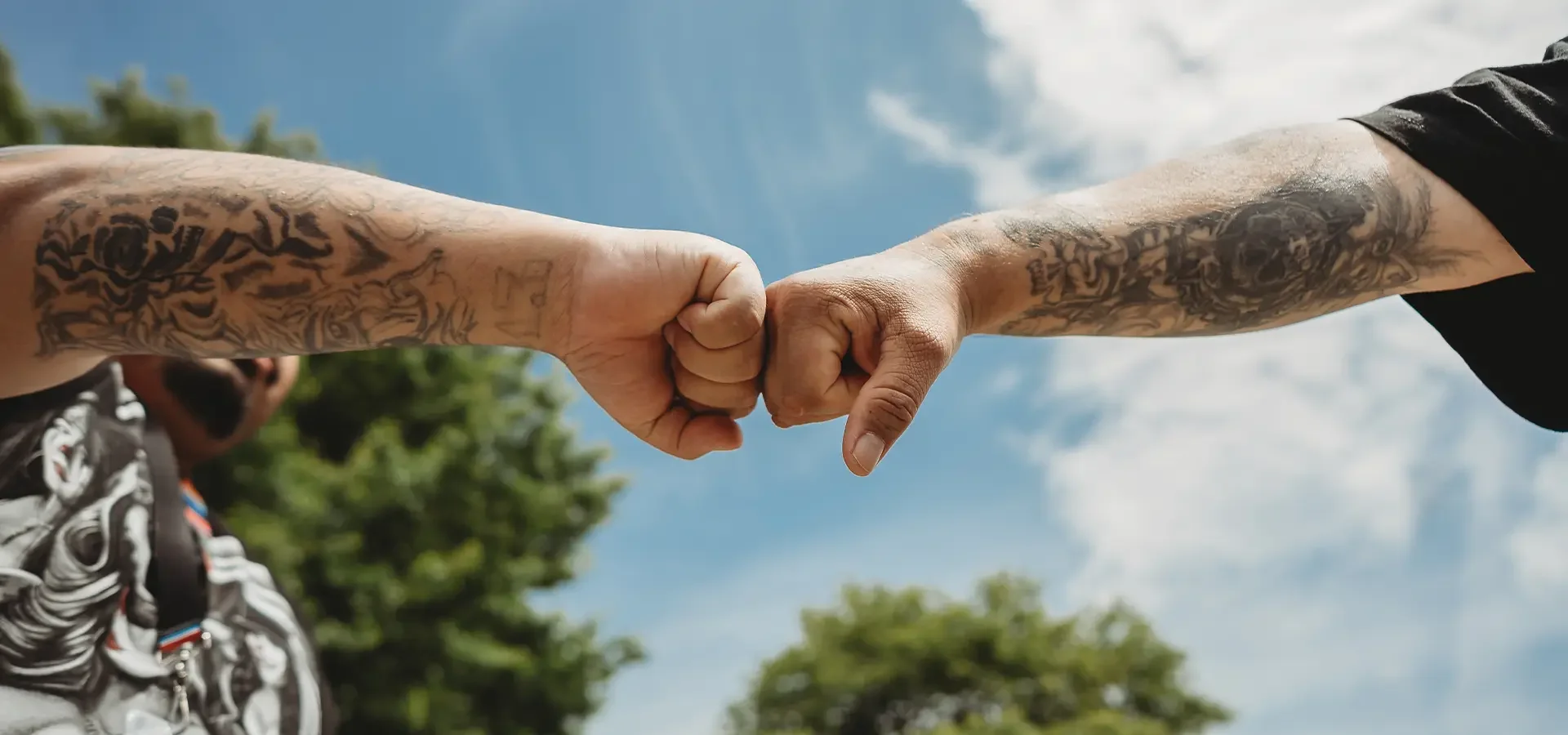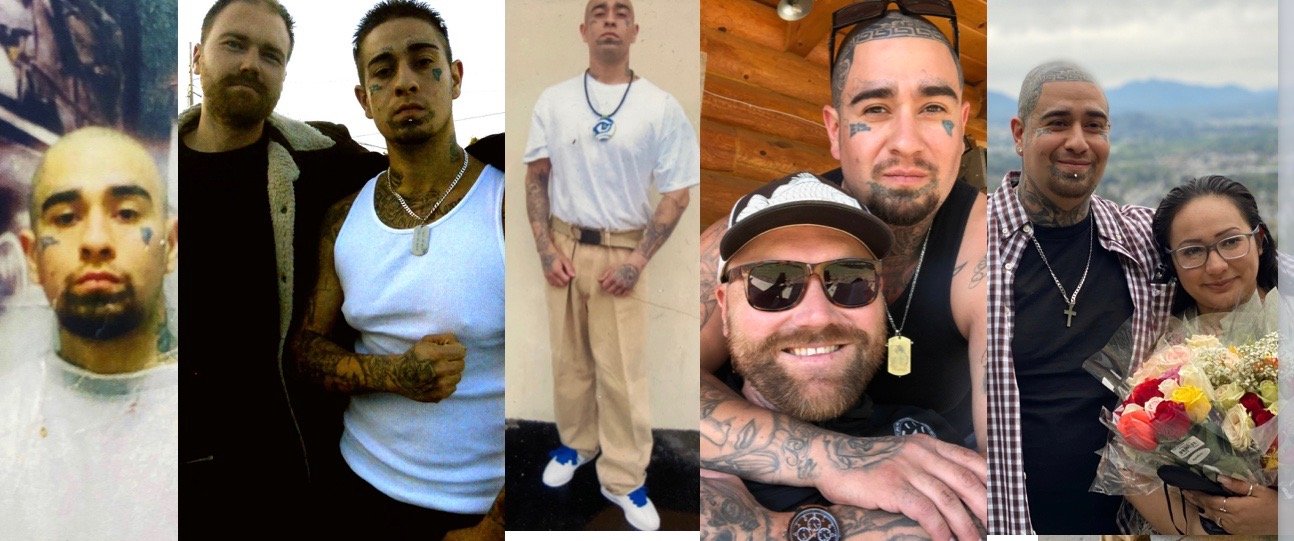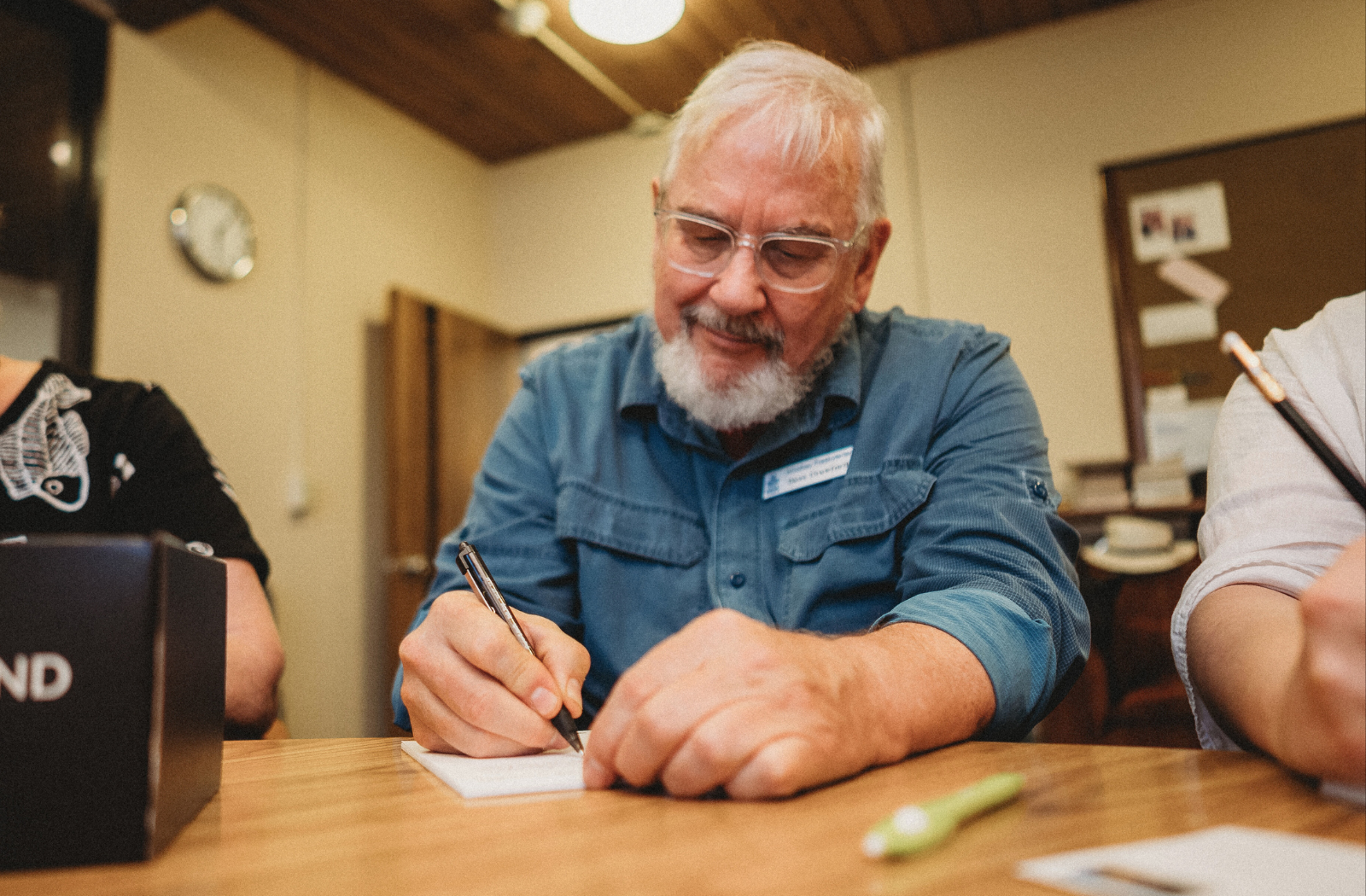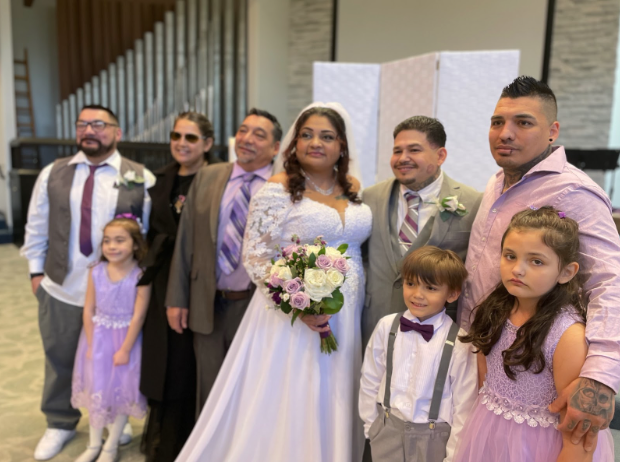
What if this is just the beginning?
This is the second to last module in the One Parish One Prisoner learning. You’ve made it this far. You’ve been through a lot together.
Bless you.
You’ve reached your hands and hearts into the American underground—the prisons, the civic burial sites, and the hidden places beneath the surface of your community.
You’ve been part of opening legal gates, opening relationships, opening conversations.
You’ve seen something new.
You have been witnesses to the resurrection, even if your experience was imperfect and incomplete.
What if this is just the beginning?
The early church movement began with a handful of women and men who had a life-altering experience at the tombs, and then ran to their wider community to tell the story and pray together about what’s next.
These final two modules will help you follow this earliest of traditions.
A LONG WALK TOGETHER
“We stay in relationship. God works through relationships that transform us. We trust that and follow what God has put in front of us.”
— Doug, team pastor
When we first started building One Parish One Prisoner in 2017 with a handful of teams, we quickly learned a foundational lesson.
Terrance had only been out of prison a few months. He was still wearing a GPS ankle monitor, not even past his official “release date” yet.
He told me his One Parish One Prisoner team all gathered, on a sunny Sunday morning, excited to see him again in person after pandemic distancing. After about an hour of catching up about their lives, one team member asked, “So what’s next? Do we keep meeting? Are we done?”
“I just stayed quiet,” Terrance told me on the phone. “I thought I’d just see what they were thinking.”
Another team member said, “I think we are done.”
Another said, “Well, maybe we’re done with Terrance. But I think we start with the next guy now?”
The rest of the team agreed.
We are so used to programming and helping the maximum number of people.
Terrance sounded hurt telling me this on the phone. “The next guy? Oh, OK. It’s like that, then? I mean, I dunno.” He paused, not wanting to sound ungrateful, not wanting to sound foolish:
“I thought we were building lifelong friendships. Isn’t that what this was all about? I feel kinda dumb for wanting that now. I mean, if this was just a little bit of help when I get out and ‘see ya later, good luck,’ I coulda just used the resource center downtown. I didn’t know this was just a short walk kind of thing.
— Terrance, released participant
The line was quiet. I listened, nodding.
“I don’t want to sound ungrateful for all they’ve done and all their kindness, but I thought this was about a long walk together.”
Terrance understood better than his team what this journey is all about. He knew he was just getting started.
These final two modules help us look beyond the “program’s end” to imagining a “long walk together”:
What if this is this just the beginning of our relationship with our resurrecting friend?
What if this is this just the beginning of a transformation inside me?
What if this is this just the beginning of a larger call for our church?
What if this is just the beginning of a larger resurrection movement?
WHAT IF THIS IS JUST THE BEGINNING OF OUR RELATIONSHIP?
This program has connected you, built a bridge between your worlds, a structure to assist in the resurrection and re-entry process together. Now you don’t need the training wheels; you can ride as you please. Your lives are connected now. You don’t need prison letters or video visits to chat now. You can text and call and see how each other are doing.
Essentially, this is your neighbor—hopefully, a friend.
And resurrection—healing, reintegrating into society from years of prison and isolation and separation from family, economy, earth—can take years.
Your active relationship may be different than what you expected or hoped for, depending on how your released friend is doing in the re-entry journey. Here are some common situations:
IF THEY’RE DOING WELL:
Stay connected! They’re entering the land of the living. Revisit the Magic Season module.
How do you integrate this relationship into your own life and your community’s life?
Monthly coffee or a walk? Is there a role at the church you can invite them to fill? Playing Greeter, Usher, or setting up for service? Invite them to join in feeding the homeless or preparing the fellowship hall when the blood drive comes. Invite them over for holiday meals and special events, like you would with a cousin or nephew new to the area.
Remember, resurrection takes years. There are so many stones to continue rolling away, for men and women who stay out of prison over a year: petitioning to remove old charges off records, starting a new lease, larger debts to cancel, custody to gain in kids’ lives.
You’re not “responsible” to solve everything. But we are the Department of Connections. You have immense social capital: connections. A bank manager. A lawyer. A social worker. Someone with snowshoes for a family outing or kayaks to borrow on a sunny afternoon. Tickets to the stadium for the game.
Nothing beats a good phone call. How’ve you been? Time to listen. Tell them how you’re doing. Be real.
Mark your calendars for one year from release date. Celebrate that together.
IF THEY’RE BACK IN JAIL OR PRISON:
You’re back at the tombs together. You’ve been here before. The cycle begins again. You have more practice now. Keep meeting as a team. Weep, as Jesus did for his friend Lazarus.
The criminal punishment industry is layered and punitive and not built with healing or restoration in mind. Your friend being back inside a facility may be a tragic (yet common) overreaction of the parole/probation/arrest system. It’s possible your friend was understandably slipping and struggling, but when they needed more assistance and healthy intervention, they were snatched up like a menace to society.
Stay connected! Drop a letter to the local jail, if they’ve been arrested. Look up their name on the county roster or the state prison database online. They probably are drowning in self-contempt, beating themselves up for letting you all down, assuming you hate them, imagining all this was a waste of time.
You can drop a note that washes that ugliness away: “We love you. We miss you.” Keep it simple. You don’t need to fix the entire situation. Just finding them with a word of grace is so often what resurrection looks like: think about Jesus coming to the disciples after they abandoned him. “Peace,” Jesus says to break the ice, knowing our anxiety and fear and guilt. “Don’t be afraid.”
Get the kids to draw colorful pictures to mail in. Imagine your friend opening that in a depressing jail cell with a short letter from the team: “We’re not going anywhere. We’re here. We care about you. Thanks for letting us get to be part of your life. You’re stuck with us now ;) Hope to hear from you.”
Mercy reaches deeper into all of us. We are gaining the heart of God.
Don’t send any money, remember. Back to basics, same as at the beginning: relationship over resources. That’s where the healing’s at.
This is hopefully just the beginning of your long relationship with someone who has only begun to taste a very different kind of care from you. It can take years to rewire brains and heal spirits that have been formed by years of untrustworthy relationships.
That’s OK. We stay in relationship. God works through relationships that transform us.
Your friend, through the months with your team, now has a glimpse of what is possible. It takes a while to learn freedom. To heal.
So if they write you, bring it to the team. Stay connected as a team. Look at their new release date. Do they want to try again? Don’t make a decision right away. Just assure that you love them, and see if they stay in touch over the coming months. Watch, wait, pray. Don’t be in a rush.
Don’t run from the feelings. You can grieve that your friend is back in the tombs. Feel the anger. That broken heart, that weeping, it takes us right back to the start: Jesus wept when his friend Lazarus was in the tomb. It’s the beginning of any resurrection story, the secret to resurrection power.
This has been the case with at least half the individuals we’ve loved who’ve been sucked back into the prison system. It’s devastating to watch. It’s easier to get mad at the broken human than at the dehumanizing system.
IF THEY’RE OUT ON THE STREETS, NOT RESPONDING:
Wait. Reach out occasionally, send a message that your team misses them, love them, and wants to get together. And wait for them as God waits for us—with patience, tenderness, and a persistent, not-in-a-rush hope.
“God didn’t try fixing me. But he was there. Always. Until I was ready.”
— Tony, released participant
Another retired gentleman on the team with Tony, above, agreed. He had deepened with patience over time, and shared about his years in Alcoholics Anonymous, walking his own slow healing alongside others in recovery:
“The nice thing about a loving God is he lets us make our own choices. He won’t control us. When we get ourselves into hot water, we ask for help. He waits for that. He loves.”
— Rick, team participant
That sounds like the Welcoming Prayer: we let go of control, and so learn the un-controlling love of God.
This is what we mean with that question we ask at each month’s team meeting: What am I learning, through this relationship, about God’s heart?
Same thing with waiting. Father Greg Boyle says, “Ours is a God who waits. Who are we not to?”
As you wait, make space for these feelings, these tears. We grieve differently—from each other and from one hour to the next. Lean in. Pray the Welcoming Prayer. You are being formed into the heart of God,. and entering the ache and power of the resurrection.
As you wait, keep meeting as a team. You are not alone.
As you wait, hold this question: Whatever struggle or sickness is keeping your friend from entering a fuller life on this round—how many thousands of others leaving prison have this exact same story? You’ve been up close to one.
We’ll say it again: this might just be the beginning.
RESURRECTION IS A CYCLE
As you’ve heard in stories and videos throughout these modules, our returning brothers’ and sisters’ journeys rarely follow a straight line, or fit neatly within a two year program!
Many of our formerly incarcerated staff members here at Underground went back to prison after a few attempts at reentry. Our friendships deepened each time. We learned to trust. We tried again. Now Alex, Leroy, Corinna, Roger and hundreds of others are working, in college, raising their kids, on nonprofit boards or staff, and leaders in our community.
There is no “failure.” There is only learning faithfulness. And recognizing where we are in this resurrection cycle together. The transformation is mutual.
So when people in your congregation ask about your releasing friend, you don’t need to feel pressure to have some “success” story. You can tell them where you are in the ancient story right now.
And invite them into the long walk together.
WHAT IF THIS IS JUST THE BEGINNING OF A WORK INSIDE ME?
What has this relationship done to you?
We’ve been asking this question in our post-silence reflection questions at the start of each team meeting. God is changing our hearts as we’ve approached the tombs of our culture together and removed our own protective layers. How are you being transformed through this?
In our very first One Parish One Prisoner pairing, the entire church rallied around their releasing friend Leroy: weekly updates during “prayers of the people,” a big fundraiser to pay off fines, safe housing opportunity secured, rides lined up to take him to appointments. We picked him up from his facility and the next day all sat at a banquet table at the Mexican restaurant across town, the week after Easter. He even got a gym membership to share with one of the men on the team.
But Leroy hid his mounting anxiety, insecurities, and loneliness—and soon disappeared, reaching out to the very gang and drug contacts on the streets he promised himself he’d never go back to.
The team was crushed.
As we reflected together in the months that followed, and later shared with the congregation, we started to tell stories.
Like how two of the women can’t help but drive slower now, all through town: “Each young man I see walking the sidewalks, I think, Is that Leroy? No. Wait, is THAT Leroy?”
These white, middle-class church grandmothers, who may have feared tattooed, gang—affected Mexican men in our valley for years—now they see the beloved everywhere, looking down alleyways, searching for their lost friend.
They hadn’t realized this is part of God’s transforming work in them, in their church! Even if Leroy wasn’t fully ready to transform his entire life, what if every church in America had congregants with renewed eyes and hearts for their neighbors like this? It happens through one relationship.
Folks in the church would always come up to team members and ask, “Where’s Leroy?” At first it made the team feel awkward, ashamed to say they didn’t know, like the “program failed.” Then they realized never before had they asked, with hope, why a former gang member wasn’t worshiping with them that Sunday.
The congregation now felt a Leroy-shaped hole in their midst.
What has this relationship done to your congregation? Your family?
(Years later, Leroy surfaced. Letters from prison. He was ashamed. He was coming releasing again and wanted to know if people would still be there for him. Two years later, Leroy is home, married, working a manufacturing job, and becoming a core member of the Underground Ministries community, as well as his OPOP team.
When we wait, when we are faithful, resurrection happens more easily.)
YOUR STORY SO FAR
Enough reading.
Now it’s time for your story, your voice. We want to learn from you.
This month, as we ask Is This Just the Beginning?, we have built a special space in this module for you to actively review some of your journey so far, typing in some of your reflections and memories. This helps you get specific, draw closer to what you’ve seen and experienced.
LET’S MEET!
Our Parish Mobilizer will be joining your team meeting, when you meet to discuss this module.
Remember your Kickoff Orientation? This is our chance, almost two years later, to come back together and reflect with you.
This is a core part of the journey, and we hope everyone on the team can participate. Including your releasing friend, if they can make it!
During this Capstone Reflection, we will review your Story So Far, and consider ways to share this story, and ask, “Is this just the beginning?” with your congregation in the final module, CAPSTONE PROJECT.
ACTION STEPS
CALL OR CONTACT YOUR RELEASED FRIEND THIS WEEK: If they’re available, find a time to meet up and do something together.
TEAM MEETING WITH OPOP STAFF: Time to reflect on this journey even if it has looked differently than we thought.
PLAN A TIME TO BRING THESE STORIES AND QUESTIONS TO THE LARGER CHURCH NEXT MODULE
FOR TEAM DISCUSSION
Gather this month with a staff member from One Parish One Prisoner to discuss the following questions and prepare for the final module.
IT STARTS AT THE TOMBS: How would you describe your early months of getting to know your new friend—via prison letters, calls, visits? What was that like for you?
ROLLING AWAY THE STONES: What were some of the “stones” or barriers your team worked to roll away together? Did any stand out as surprising, or requiring immense work? Any breakthroughs?
REMOVING THE LAYERS: Did your team discover any wounds that you have in common with your releasing friend? (i.e. addiction, depression, abuse, loneliness, family deaths, etc.) What has been tenderly revealed? Please share what you can, no names necessary.
RESURRECTION: How has your releasing friend stepped into new experiences in the “land of the living” outside prison? How have you experienced any personal growth? What do you see shifting in your family or congregation?









